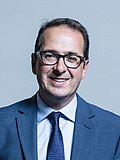After the referendum
The pressure on Corbyn intensified as a result of the European Union referendum and dissatisfaction with his level of support for the losing Remain campaign. [21] On 25 June, a 'Saving Labour' campaign website was created, to encourage members of the public to email MPs to urge them not to back Corbyn. [22]
Shadow Cabinet resignations
On 25 June Hilary Benn, a critic of Corbyn, contacted members of the shadow cabinet to inform them that he had lost confidence in Corbyn. He was subsequently sacked as shadow Foreign Secretary, triggering a series of Shadow Cabinet resignations; at least 20 individuals resigned over the next few days. [4] An article in The Observer , published online at 10 pm on 25 June, [23] claimed that Benn had been sounding out a challenge against Corbyn. [3] [21] [24] Corbyn assembled a new Shadow Cabinet, and insisted that he would not resign. [7]
Vote of no confidence
A vote of no confidence in Corbyn was made by the parliamentary party on 28 June, with Corbyn losing the vote by 172 to 40, with four spoiled ballots and thirteen absentees. However Labour Party rules did not require Corbyn to resign as a result of the vote. [5] Corbyn struggled to fill a new Shadow Cabinet, which had to be reduced in size from 31 to 25. [25] The Scottish National Party sought to argue that they should become the official Opposition in the Commons with Labour unable to fill the role. [26]
Leadership challenge
Corbyn continued to refuse to step down as leader, saying that the ballot had "no constitutional legitimacy" and he would not "betray" the members that elected him in the 2015 leadership election. [27] In order to challenge an incumbent leader, a serving Labour MP needed to gather the support of at least 20% of Labour MPs (15% of Labour MPs and also MEPs being required if a leader has resigned). [28] Angela Eagle, a former member of his Shadow Cabinet who resigned after Benn's sacking, was said on 30 June to have the number of backers required to launch a challenge. [29] Separate meetings to discuss the situation were held by Corbyn and Watson with UNITE trade union leader Len McCluskey on 5 July. [30]
Following the sacking of Hilary Benn, and the vote of no confidence in Corbyn's leadership, over 100,000 new members were reported to have joined the Labour Party by 8 July, taking membership numbers above 500,000. [31] Both supporters and opponents of Corbyn signed up new members. [31]
By 8 July there were no declared leadership challengers, Corbyn had not resigned, and both his supporters and some critics considered that he was in a good position to win any leadership vote. [32] [33] Corbyn challenged the rebels to stand against him, [34] and it was reported that Eagle had secured the support of at least the requisite number of nominations needed to launch a leadership bid. [35] The following day, Eagle announced that she would formally launch her campaign on 11 July. [8] In her speech, Eagle said "Jeremy Corbyn is unable to provide the leadership this huge task needs." [36]
The party's National Executive Committee (NEC) meeting on 12 July was expected to consider the arrangements for an election. [37] The arrangements were decided by secret ballot with the vote 18 to 14 in favour of the incumbent leader being automatically on the ballot. [38] The NEC also decided to not allow members who joined the party in the past six months to vote in the leadership election, so the approximately 130,000 new members who had joined since the European Union referendum would be unable to vote. Instead registered supporters were given a period of two days to register, at a fee of £25, to be entitled to vote. [39] [40] Additionally the NEC ruled that local Constituency Labour Parties should not hold members' meetings during the leadership election period. [41]
There was pressure before the nominations close on 20 July for one of the two challengers, either Smith or Eagle, to withdraw in order to unify the anti-Corbyn campaign. The two agreed between themselves that whoever had fewest nominations from MPs/MEPs by the end of the working day on 19 July would withdraw in favour of the other. Eagle, with about 20 fewer nominations, did so, leaving Smith as the only challenger to Corbyn. She pledged her support for his campaign. [13] [42] Smith explained that his decision to run for leader was partly because the future of the Labour party was at risk, stating that the "possibility of split is dangerously real". [43]
Reaction
Andrew Rawnsley, chief political commentator for The Observer , described the leadership race as a crisis for Labour, which he saw as "fighting for its life." On 24 July 2016, he discussed the "mutiny" against Corbyn by the majority of MPs who voted against him in the no confidence motion but warned that they "do not have the backing of a large chunk of the party selectorate [party members who will vote in the leadership election] that picks the leader... [but that selectorate] is wildly unrepresentative of the voters that Labour must persuade if the party is to survive as a plausible opposition, never mind become a viable competitor for power." [44]
Leadership contender Owen Smith had supported the campaign for Britain to remain in the European Union, in the referendum on Britain's membership in June 2016. [45] During an interview with the BBC, Smith opined that those who had voted with the Leave faction had done so "because they felt a sense of loss in their communities, decline, cuts that have hammered away at vital public services and they haven't felt that any politicians, certainly not the politicians they expect to stand up for them, the Labour Party, has been standing up for them." [46]



